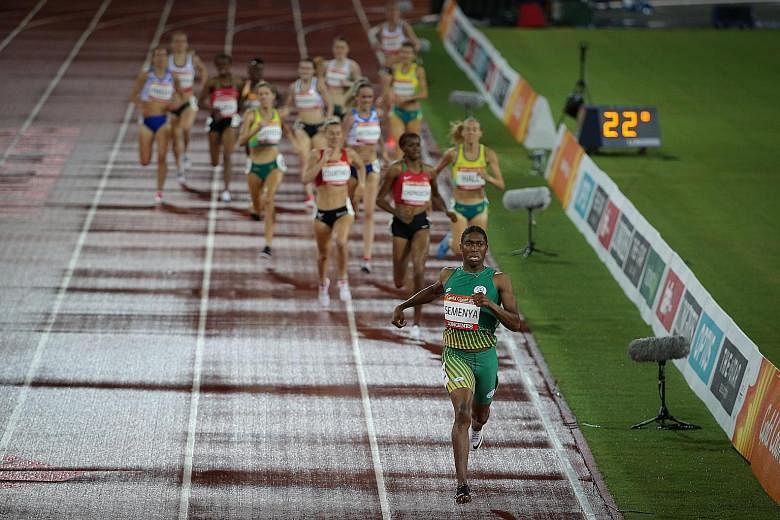LONDON • Olympic 800m champion Caster Semenya could run up to seven seconds slower under new rules requiring her to lower her natural testosterone levels to race internationally, a prominent sports scientist has predicted.
Under rules announced yesterday morning by the International Association of Athletics Federations, there is to be a separate female classification for an athlete with differences of sexual development (or DSDs).
Athletes, including Semenya, will have to reduce and then maintain their testosterone levels to no greater than 5nmol/L by Nov 1 if they want to compete in events ranging from 400m to a mile.
The IAAF believes its new rules will "preserve fair and meaningful competition in the female classification" because women athletes with high testosterone have an advantage of up to 9 per cent over women with normal levels.
The move, which is sure to divide opinion and has been seen as targeting Semenya, was unanimously approved by the IAAF council last month.
The 27-year-old has long raised controversy because of her powerful physique and deep voice related to hyperandrogenism, the medical condition which causes a person to produce high levels of male sex hormones. She responded to the news by retweeting messages of support and the slogan: "How beautiful it is to stay silent when someone expects you to be enraged."
She also tweeted: "I am 97 per cent sure you don't like me, but I'm 100 per cent sure I don't care."
-
FIGURING OUT THE 800M
-
1:40.91
MEN'S WORLD RECORD - DAVID RUDISHA, 20121:50.56
SINGAPORE MEN'S RECORD - SINNATHAMBI PANDIAN, 19871:53.28
WOMEN'S WORLD RECORD - JARMILA KRATOCHVILOVA, 19831:55.16
CASTER SEMENYA'S PERSONAL BEST, 20172:01
SEMENYA'S ESTIMATED TIME UNDER NEW RULE - JUST INSIDE THE TOP 200 TIMES LAST YEAR2:07.4
SINGAPORE WOMEN'S RECORD - CHEE SWEE LEE, 1976
According to world-renowned sports scientist Ross Tucker, the effect will be significant on athletes such as Semenya. "I would predict that Semenya will be five to seven seconds slower over 800 metres," he wrote on the rule change.
"The other really interesting thing is that, guided by the new International Olympic Committee (IOC) transgender policy that lowers the upper limit for testosterone to 5nmol/L, the IAAF is setting their limit at 5nmol/L.
"It used to be 10. That will slow the times of these athletes down even more than it did in the past."
He told The Guardian: "History suggests Semenya will lose about four seconds to five seconds. Because in 2013 and 2014, when the IAAF was diligent about ensuring her compliance with the upper limit at that time (10nM), she was running 2min... Now, at 5nM, that effect will be even larger, I suspect. She will go from a 1:54 to 2:01-2:03, (that) is my estimate."
The South African burst onto the scene in 2009 when she won the world 800m title, but was then required to take testosterone-suppressing medicine by the IAAF in order to compete.
In July 2015, the Court of Arbitration for Sport reversed that rule when it examined the Dutee Chand case - allowing inter-sex athletes to compete without taking testosterone-suppressing medication.
Research by the IAAF since then has shown that in certain events, testosterone does make an enormous difference. An IAAF report notes that "most females have low levels of testosterone circulating naturally in their bodies... but individuals with DSDs can have very high levels of natural testosterone, extending into and even beyond the normal male range".
The IAAF also makes it clear that science is on its side, saying high levels of natural testosterone can "increase their muscle mass and strength... and significantly enhance their sporting potential".
In its report, it writes: "There is a broad medical and scientific consensus that... shows clearly that (at least in certain events), DSD athletes with levels of circulating testosterone in the normal male range have a very significant competitive advantage over female athletes with testosterone levels in the normal female range."
In explaining its decision, the IAAF said it was trying to create "a level playing field and ensure that success is determined by talent, dedication, hard work, and the other values and characteristics that the sport embodies and celebrates".
AGENCE FRANCE-PRESSE, REUTERS, THE GUARDIAN

